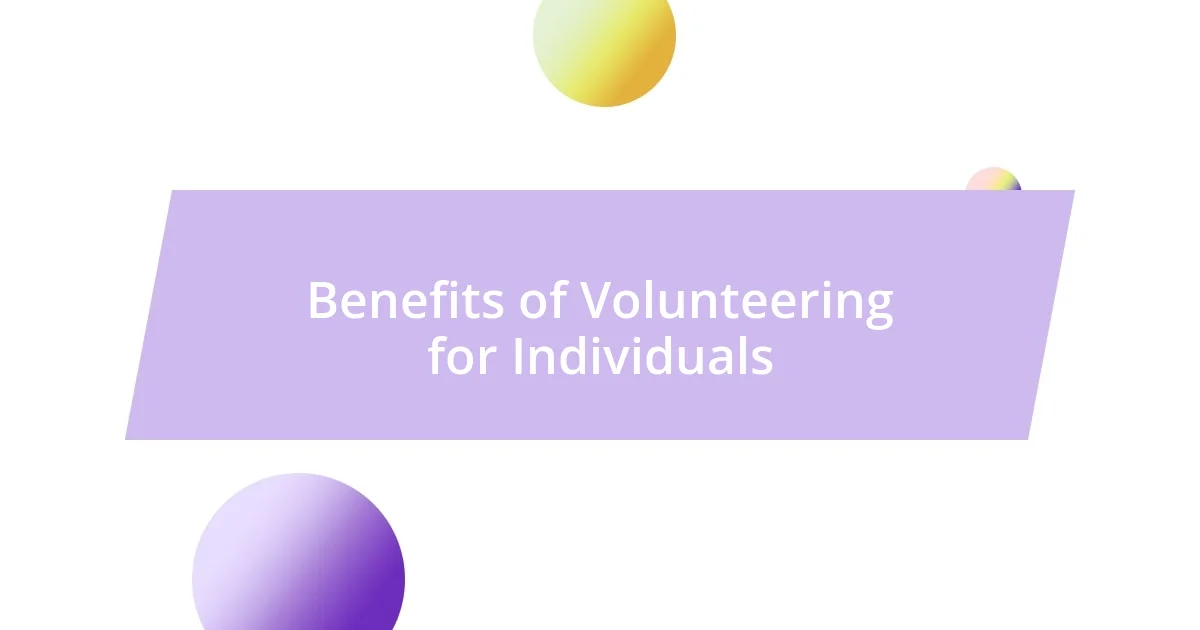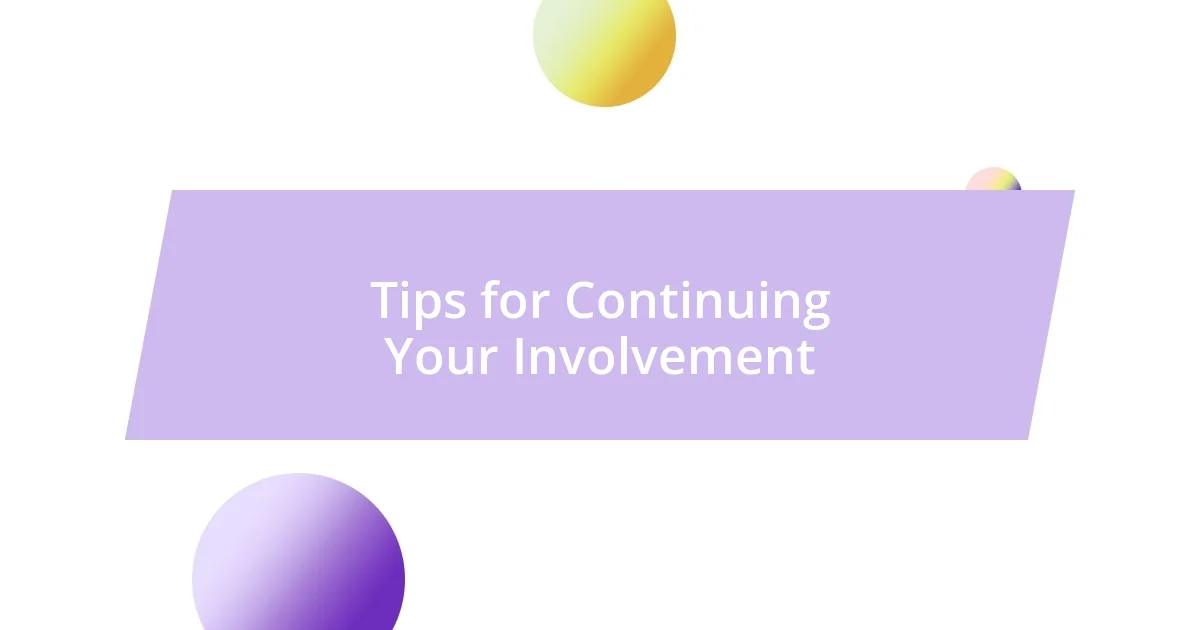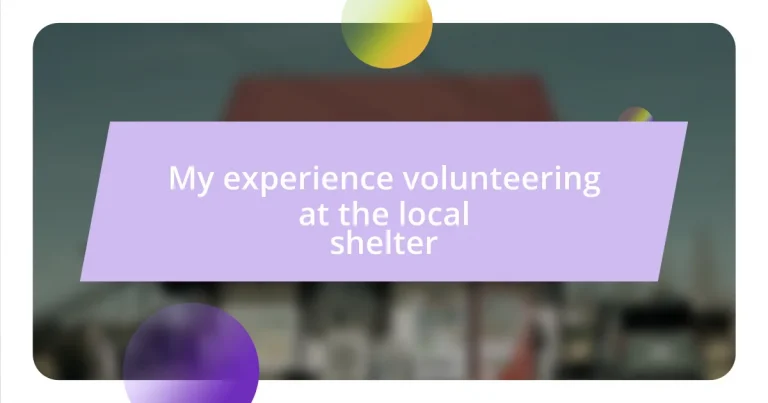Key takeaways:
- Volunteering at shelters fosters deep emotional connections and a sense of fulfillment through acts of compassion.
- Individuals benefit personally from volunteering by experiencing growth, improved mental health, social connections, and skill development.
- Consistency in volunteering, engagement in shelter activities, and seeking feedback are vital for enhancing the overall experience and impact.

Reasons to Volunteer at Shelters
Volunteering at a shelter offers a unique opportunity to connect with vulnerable members of our community. I remember my first day; as I walked in, I was greeted by a shy dog who simply wanted to feel safe. It struck me then how impactful our presence can be—sometimes, just a gentle touch or a warm voice makes all the difference.
Another reason to volunteer is the sense of fulfillment it brings. Helping others often leads to a deeper understanding of gratitude. During my time at the shelter, I met a woman who, after months of struggling, found solace in the companionship of a rescue cat. Witnessing their bond reminded me of the importance of compassion and how it can uplift both the giver and the receiver. Have you ever experienced a moment where your small action brightened someone’s day?
Moreover, volunteering can broaden your perspective on the challenges many face. I often thought I understood hardship, but hearing the stories of both the animals and the individuals—each one unique—humbled me. It made me realize just how interconnected we all are, stirring a desire in me to advocate for change. What insights could you gain if you opened your heart to others in need?

Benefits of Volunteering for Individuals
Volunteering brings an array of personal benefits that often extend beyond the act itself. One afternoon, I found myself in the middle of a community meal event at the shelter. I was not only serving food but also listening to the stories shared among those gathered. In that moment, the warmth of connection struck me—sharing laughter and hope created this beautiful tapestry of community I had never fully appreciated before. Moments like these foster a sense of belonging and purpose that many may seek in their lives.
Here are some key benefits of volunteering for individuals:
- Personal Growth: Engaging with different perspectives challenges your beliefs and aids your personal development.
- Improved Mental Health: The act of helping others can reduce feelings of anxiety and depression, promoting overall well-being.
- Social Connections: Volunteering allows you to meet new friends, creating a supportive network that can enhance your life.
- Skill Development: You gain essential skills such as leadership, teamwork, and problem-solving that can benefit you in personal and professional arenas.
- Increased Happiness: The joy from giving back tends to boost happiness levels, creating a fulfilling sense of achievement.
Even on days when I was exhausted, returning to the shelter always filled my heart with renewed energy—each tail wag and grateful smile reminded me of the joy found in serving.

Preparing for Your Volunteer Experience
Preparing for your volunteering experience can be both exciting and a bit daunting. It’s essential to mentally prepare yourself for the unique challenges that come with working at a shelter. I remember my first volunteer day; I had butterflies in my stomach, not just from nerves but also from anticipation. Taking the time to understand the shelter’s mission and the needs of the animals can truly set the stage for a meaningful experience. Have you ever gone into a new environment unsure of what to expect? Gathering information about your role can ease the transition.
In terms of logistics, practical preparations are just as important. Consider what supplies you might need—comfortable clothing that you don’t mind getting dirty, sturdy shoes for long hours, and perhaps a reusable water bottle to stay hydrated. One day, I forgot to bring an extra layer, and the chill of the air made it difficult to focus on the tasks at hand. Being prepared physically allows you to give your best to the animals and fellow volunteers.
Lastly, I highly recommend reaching out to others who have volunteered before. Their insights can be invaluable. When I connected with a seasoned volunteer prior to my first shift, I learned little tips that made a significant difference in my experience. Simple advice, like knowing the best times for feeding or playtime, helped me feel more at home quickly. Have you had anyone guide you before embarking on a new adventure? It truly can make all the difference in feeling welcomed and ready.
| Preparation Aspect | Tips |
|---|---|
| Mental Preparation | Research the shelter and understand their mission |
| Logistical Prep | Wear comfortable clothes and shoes, bring a water bottle |
| Community Connection | Speak with experienced volunteers for insider tips |

Reflecting on Your Volunteer Impact
Reflecting on the impact of my volunteer work, I often find myself marveling at how deeply I connected with the individuals I encountered. One afternoon, a young woman opened up about her struggles while I helped set up an event. Listening to her story made me realize that my presence was more than just an act of service; it was about being there for someone who needed a listening ear. What struck me was how such small moments of empathy can create ripples, inspiring hope and fostering resilience in others.
As I think back on my time at the shelter, I recognize how the experiences enriched my understanding of humanity’s challenges. Each interaction provided a new lens through which to view the world, challenging my perspective. I remember a day filled with laughter during a pet adoption event; seeing families come together over a new furry friend emphasized the joy that can emerge from even the toughest circumstances. It’s fascinating how volunteering doesn’t just change the lives of those we help—it transforms us, sparking a shift in how we relate to ourselves and others.
The impact of volunteering truly resonates when you realize that it’s a shared journey toward growth and healing. I often ask myself, how can we measure the depth of the connections formed in such spaces? Volunteering has taught me that every smile and each shared moment carries immense weight. It solidifies my belief that our collective experiences create a stronger community, reminding us that we are all integral parts of something much larger than ourselves.

Tips for Continuing Your Involvement
Continuing your involvement at the shelter can be incredibly rewarding. One little tip that really helped me was setting a regular schedule for my volunteering hours. Initially, I thought I could pop in whenever it was convenient, but I soon realized that consistency made me feel more connected. Have you ever felt that sense of belonging that comes from routine? It’s amazing how showing up at the same time each week can turn acquaintances into friends.
Another aspect I found essential was staying engaged with the shelter’s activities beyond my shifts. I started attending events and workshops, which not only broadened my understanding but also fostered a deeper bond with the community. I still remember my first fundraising gala; I was surprised at how much fun I had meeting fellow volunteers and supporters. Have you ever participated in an event that ignited your passion even further? Those connections often lead to further opportunities to help.
Lastly, never underestimate the power of feedback. I made it a habit to check in with the shelter staff about my contributions after each shift. They offered insights that not only improved my skills but also deepened my commitment. I recall a moment when a staff member mentioned how my enthusiasm with the animals lifted the spirits of others. How often do we get to know the uplifting impact we have on those around us? That acknowledgment fueled my desire to continue giving and evolving as a volunteer.














